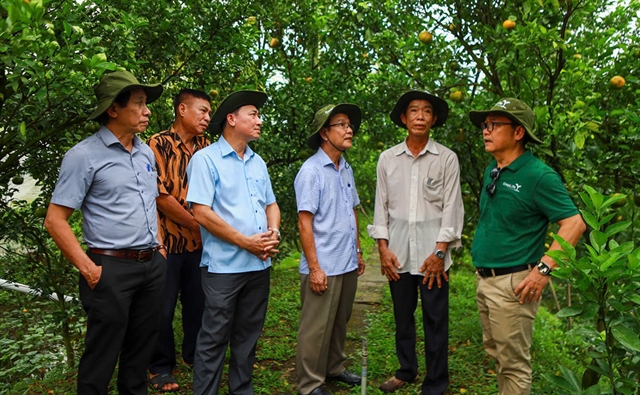Sustainable farming practices drive positive change in Đồng Tháp agriculture
Society – Economy - Ngày đăng : 13:54, 07/12/2024
 |
| Delegates visit a mandarin farming model at a local household in Long Hậu Commune, Lai Vung District. — VNS Tố Như |
ĐỒNG THÁP — More than 95 per cent of agricultural input retailers in Đồng Tháp Province now actively advise farmers on potential risks associated with pesticide use, according to Huỳnh Tấn Đạt, director of the Plant Protection Department under the Ministry of Agriculture and Rural Development.
Speaking at a review conference held in Cao Lãnh City, Đạt outlined the achievements of the safe, effective, and responsible pesticide use programme, a collaborative initiative launched in 2021 and running through to 2026.
The programme is a partnership between the Plant Protection Department, Đồng Tháp Province's Department of Agriculture and Rural Development, and CropLife Việt Nam.
Đạt stressed the department’s efforts to work alongside local authorities and industry partners in disseminating legal regulations and best practices for pesticide use.
"The implementation of this programme demonstrates our long-term commitment to sustainable agricultural development," he said.
Positive engagement from farmers has been a highlight of the programme’s first three years. Training sessions have helped improve awareness and foster safer farming practices, reinforcing the importance of public-private partnerships in improving agricultural sustainability.
By the end of 2024, the programme had trained over 3,700 farmers, nearly 1,000 agricultural retailers, and 100 technical officers, while distributing 3,700 sets of protective gear, according to Lê Văn Chấn, deputy director of Đồng Tháp's sub-department of crop production and plant protection.
It also established six demonstration models of responsible pesticide use across 350 hectares, involving over 600 households and focusing on crops like rice, flowers, durian, chilli, mango, and citrus fruits.
Between 2022 and 2023, the programme collected over 21 tonnes of used pesticide packaging while also distributing educational materials, broadcasting instructional videos, and installing informational panels in key farming areas.
Impact on behaviour
In 2024, the programme’s impact assessment showed significant progress, with farmers’ knowledge of pesticide use rising by 6 to 34 per cent, depending on the topic, and reliance on habits or experience when purchasing pesticides dropping by 21.7 per cent.
However, challenges persist, including the inconvenience of using protective gear and insufficient collection points for used packaging.
Participants suggested practical training on drones and biological pesticides, improved visual materials, and more interactive discussions with experts and retailers.
Huỳnh Tất Đạt, deputy director of Đồng Tháp Province’s Department of Agriculture and Rural Development, said that adopting sustainable farming methods not only brings economic, health, and environmental benefits but also enhances the branding and value of local agricultural products.
"We look forward to ongoing support from all parties to implement more policies that increase farmers’ incomes and achieve the province’s agricultural development targets," he said.
Chairman of CropLife Việt Nam, Đặng Văn Bảo, underscored the role of member companies in integrating training with product introduction.
He expressed hope that the programme’s success in Đồng Tháp would inspire similar initiatives across the country, fostering a modern and sustainable agricultural sector.
The conference also featured a farmers' competition on responsible pesticide use as well as a signing ceremony for the programme’s 2025-26 cooperation framework. — VNS
